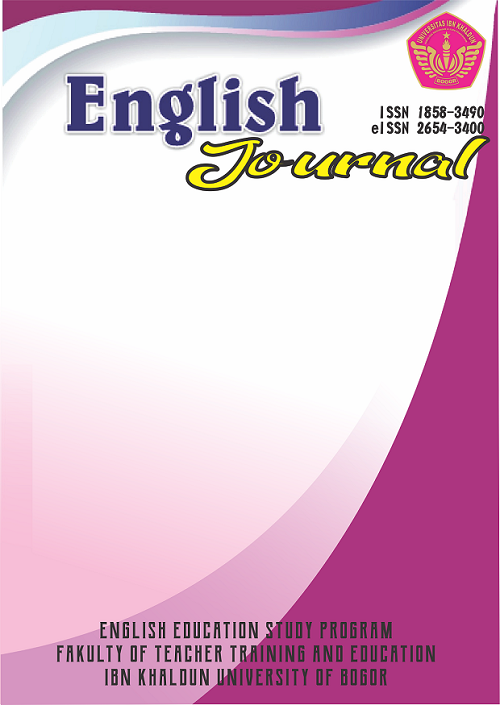HIGH-STAKES TESTING IN NEOLIBERALISM ERA
DOI:
https://doi.org/10.32832/english.v17i1.11653Abstract
A high-stakes test has been indicated to be negatively linked to teachers and students in the classroom. However, little is known about the impact of such tests on the teachers and students or those who are involved indirectly in their lives. Using an individual interview with eight English teachers from eight junior secondary schools, this study examines the correlation between the high-stake test with performativity mechanism in the pincer of markets and neoliberalism. Thematic analysis was used to analyse the qualitative data taken from the interviews. The findings indicated how test results were used as a source of promotion by schools to give stakeholders the knowledge they needed to engage in the marketized educational system fully. For school administrators and policymakers, the conclusions of this article had significant ramifications. High-stakes assessments were logically sound and theoretically justifiable, but a reliance on them too much foreshadowed replacing traditional educational ideals with the market value of education. The study offered fundamental new insights into high stakes testing as a tool of social control and oppression for students, teachers, and schools for adopting a neoliberal paradigm in education. In addition to impeding learning and teaching, the employment of high-stakes tests as performativity mechanisms also altered the work of schools and teachers, who were the front liners of the educational system.
References
Ambrosio, J. (2013). Changing the subject: Neoliberalism and accountability in public education. Educational Studies, 49(4), 316–333.
Asadullah, M. N. (2018). Madrasah for girls and private school for boys? The determinants of school type choice in rural and urban Indonesia. International Journal of Educational Development, 62, 96-111.
Bae, S. (2018). Redesigning systems of school accountability: A multiple measures approach to accountability and support. Education Policy Analysis Archives, 26, 8-8.
Ball, S. J. (2012). Politics and Policy Making in Education: Explorations in Policy Sociology. Abingdon and New York: Routledge.
Ball, S. J. (2018). The banality of numbers. In Testing and Inclusive Schooling (pp. 79-86). Routledge.
Ball, S. J. (2021). The education debate. Policy Press.
Biesta, G. (2015). Resisting the seduction of the global education measurement industry: Notes on the social psychology of PISA. Ethics and education, 10(3), 348-360.
Darling-Hammond, L. (2004). Standards, accountability, and school reform. Teachers college record, 106(6), 1047-1085.
Fahmi, M., Maulana, A., & Yusuf, A. A. (2013). Complementary Policies to Increase Poor People's Access to Higher Education: The Case of West Java, Indonesia (No. 201301). Department of Economics, Padjadjaran University.
Falabella, A. (2014). The Performing School: The Effects of Market & Accountability policies. Education policy analysis archives, 22(70).
Farikhah, N. M., Setyaningsih, E., & Sumardi, S. (2022). A Novice Teacher's Familiarity with Assessment for Learning in EFL Classroom. VELES: Voices of English Language Education Society, 6(2), 500-511.
Fryer, R. G. (2013). Teacher incentives and student achievement: Evidence from New York City public schools. Journal of Labor Economics, 31(2), 373-407.
Gershenson, S. (2018). Grade Inflation in High Schools (2005-2016). Thomas B. Fordham Institute.
Hycner, R. H. (1985). Some guidelines for the phenomenological analysis of interview data. Human studies, 8(3), 279-303.
Kelly, P. (2018). Standardized assessment and the shaping of neoliberal student subjectivities. In Testing and Inclusive Schooling (pp. 64-78). Routledge.
Lee, J. (2016). Paying for School Choice: Availability Differences among Local Education Markets. International Journal of Education Policy and Leadership, 11(5), n5.
Levine, P., & Eatman, T. K. (2016). Publicly engaged scholars: Next-generation engagement and the future of higher education. Stylus Publishing, LLC.
Matthew Knoester & Wayne Au (2017) Standardized testing and school segregation: like tinder for fire?, Race Ethnicity and Education, 20(1), 1-14.
Mahmut, í–. Z. E. R. (2020). What Does PISA Tell Us About Performance of Education Systems?. Bartın University Journal of Faculty of Education, 9(2), 217-228.
Menken, K. (2006). Teaching to the test: How No Child Left Behind impacts language policy, curriculum, and instruction for English language learners. Bilingual Research Journal, 30(2), 521-546.
Morgan, H. (2016). Relying on high-stakes standardized tests to evaluate schools and teachers: A bad idea. The Clearing House: A Journal of Educational Strategies, Issues and Ideas, 89(2), 67-72.
Mutereko, S. (2018). Marketisation, managerialism and high-stake testing: a tale teachers' views on national assessments in South Africa. International Journal of Educational Management, 32(4), 568-579.
Olsen, B., & Sexton, D. (2009). Threat rigidity, school reform, and how teachers view their work inside current education policy contexts. American Educational Research Journal, 46(1), 9–44.
Potterton, A. U. (2020). Parental accountability, school choice, and the invisible hand of the market. Educational Policy, 34(1), 166-192.
Qi, L. (2008). Has a high-stakes test produced the intended changes?. In Washback in language testing (pp. 193-212). Routledge.
Rosser, A., King, P., & Widoyoko, D. (2021). The Political Economy of the Learning Crisis in Indonesia.
Sadeghi, S., & Ketabi, S. (2014). High-stake test preparation courses: Washback in accountability contexts. Journal of Education & Human Development, 3(1), 17-26.
Schleicher, A. (2019). PISA 2018: Insights and Interpretations. OECD Publishing.
Stephanie Schroeder, Elizabeth Currin & Todd McCardle (2020): 'Solidarity, Sisters! We're All Crazy': The Moral Madness of Opting Out of High-Stakes Testing, Educational Studies, 56(4), 347-365.
Sterling, S. (2017). Assuming the future: Repurposing education in a volatile age. In Post-sustainability and environmental education (pp. 31-45). Palgrave Macmillan, Cham.
Stevenson, H., & Wood, P. (2013). Markets, managerialism and teachers' work: the invisible hand of high stakes testing in England. International education journal: comparative perspectives, 12(2).
Tomlinson, Michael (2016). Student perceptions of themselves as 'consumers' of higher education, British Journal of Sociology of Education, 38(4), 450-467.
Undang-undang Nomor 20 tahun 2003 tentang Sistem Pendidikan Nasional
Wilkins, A. A. (2012). The spectre of neoliberalism: Pedagogy, gender and the construction of learner identities. Critical Studies in Education, 53(2), 197–210.
Xerri, D., & Briffa, P. V. (Eds.). (2018). Teacher involvement in high-stakes language testing. Springer.
Yandell, J., Doecke, B., & Abdi, Z. (2021). Who me? Hailing individuals as subjects: Standardized literacy testing as an instrument of neoliberal ideology. The sociopolitics of English language testing, 3-22.

















1.png)




